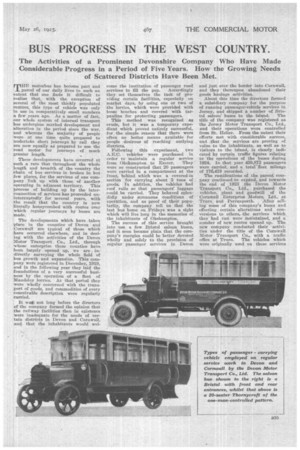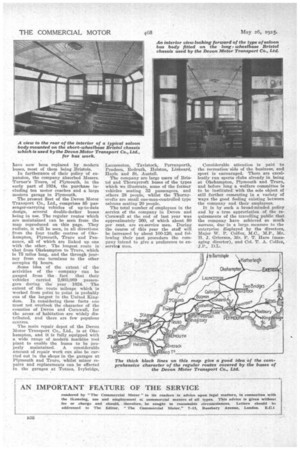BUS PROGRESS IN THE WEST COUNTRY.
Page 19

Page 20

If you've noticed an error in this article please click here to report it so we can fix it.
The Activities of a Prominent Devonshire Company Who Have Made Considerable Progress in a Period of Five Years. How the Growing Needs of Scattered Districts Have Been Met.
THE motorbus has become part and parcel of our daily lives to such an extent that one finds it difficult to realize that, with the exception of several of the most thickly populated centres, this type of vehicle was only in use in comparatively small numbers a few years ago. As a matter of fact, our whole system of internal transport has undergbne marked development and alteration in the period since the war, and whereas the Majority of people Were at one time quite prepared to undertake short journeys by rail they are now equally aS prepared to use the road motor for journeys of much greater length.
These developments have occurred at such a rate that throughout the whole length and breadth of the country the chain of bus 'services is broken in but , few Places, for the services of one company link . up with these of another operating in adjacent territory. This process of building up by the interconnection of services has proceeded uninterruptedly for several years, with the result that the country is now literally honeycombed with routes over which regular journeys by buses are made.
• The developments which have .taken place in the counties of Devon and Cornwall are typical of those which have occurred elsewhere, and in dealing with the activities of the Devon Motor Transport Co., Ltd., through whose enterprise these counties have been largely opened up, we are indirectly surveying the whole field of bus growth and expansion. This company were registered in December, 1919, and in the following year they laid the foundations of a very successful business by the operation of a fleet of Maudslay lorries. At that period they were wholly concerned with the transport of goods, and commodities of every conceivable description were regularly carried.
It was not long before the directors of the company formed the opinion that the railway facilities then in existence were inadequate for the needs of certain districts in Devon and Cornwall, and that the inhabitants would wel
come the institution of passenger road services to fill the gap. Accordingly they set themselves the task of providing certain facilities, especially on market days, by using one or two of the lorries, which were provided with loose benches and covered with tarpaulins for protecting passengers.
This method was recognized as crude, but it was a temporary expedient which proved entirely successful, for the simple reason that there were often no better means available for people desirous of reaching outlying districts.
Following this experiment, two A.E.C. vehicles were purchased in order to maintain a regular service from Okehampton to Exeter. They were so constructed that 20 passengers were carried in a compartment at the front, behind which was a covered-in section for carrying about 2 tons of goods. In addition, the vehicles had roof rails so that passengers' luggage could be carried. They behaved splendidly under strenuous conditions of operation, and as proof of their popularity, the company tell us that the last bus home on Fridays was a sight which will live long in the memories of the inhabitants of Okehampton.
The success of this service brought into use a few. Bristol saloon_ buses, and it soon became plain that the company's energies could be better devoted wholly and solely to the provision of regular passenger services in Devon and just over the border into Cornwall, and they thereupon abandoned their goods haulage activities. •
About this time the directors formed a subsidiary company for the purpose of running passenger-vehicle services in Jersey, and shipped a number of Bris tol saloon buses to the island. The title of the company was registered as the Jersey Motor Transport Co., Ltd., and their operations were controlled from St. Helier. From the outset their efforts met with considerable success, and that the services are proving of value to the inhabitants, as well as to visitors to the island, is dearly indicated by certain traffic figures relating to the operations of the buses during 1924. In that year 459,873 passengers were carried, and a total-fleet Mileage of 176,419 reeorded. .
The ramifications of the parent company continued-to expand, and towards the end of .1923 the Devon Motor Transport Co., Ltd., purchased the vehicles, plant and goodwill r of the Cornwall Enterprise Motors, Ltd., at Truro, and Perranporth: After selling some of this company's buses, and effecting Certain alterations and conversions to others, the Services Which they had run were Maintained, and a number of new routes opened up. The new company conducted their 'activities under the title of the Cornwall Motor Transport Co., with a traffic office at Truro. The vehicles which were originally used on these services have now been replaced by modern buses, most of them being Bristol.
In furtherance of their policy of expansion, the company absorbed Messrs. Turner's Tours, of Plymouth, in the early part of 1924, the purchase including ten motor coaches and a large modern garage in Plymouth.
The .present fleet of the Devon Motor Transport Co., Ltd., comprises 85 passenger-carrying vehicles of up-to-date design, aeveral double-decker buses being in use. The regular routes which are maintained can be seen from the map reproduced on this page. They radiate, it will be seen, in all directions from the four traffic centres of Okehamptan, Plymouth, Truro and Penzance, all of which are linked up one -with the other. The longest route is that from Okehampton to Truro, which is 75 miles long, and the through journey from one terminus to the other
occupies hours.
Some idea of the extent of the activities of the company can be gauged from the fact that their vehicles carried 2,603,089 passengers during the year 1924. The extent of the route mileage which is worked from point to point is probably one of the largest in the United King
dom. In considering these facts one must not overlook the character of the counties of Devon and Cornwall, for the areas. of habitation are widely distributed, and there are few populous centres.
The main repair depot of the Devon Motor Transport Co., Ltd., is at Okehampton, and it is fully equipped with a wide range of modern machine tool plant to enable the buses to be properly maintained. A considerable amount of repair work can also be carried out in the shops in the garages at Plymouth and Truro, whilst minor repairs and replacements can be effected in the garages at Totnes, Ivybridge, Launceston, Tavistock, Perranporth, Pendeen, Redruth, Helstoia, Liskeard, Hayle and St. Austell.
The company are large users of Bristol and Thornycroft buses of the types which we illustrate, some of the former vehicles seating 32 passengers, and others 28 people, whilst the Thornycrofts are small one-man-controlled type saloons seating 20 people.
The total number of employees in the service of the company in Devon and Cornwall at the end of last year was approximately 260, of which about 80 per cent, are ex-service men. During the course of this year the staff will be increased by about 100-120, and following their past procedure the company intend to give a preference to exservicii men. Considerable attention is paid to the recreation side of the business, and sport is encouraged. There are excellently run sports clubs already in being at Okehampton, Plymouth and Truro, and before long a welfare committee is to be instituted with the sole object of still further cementing in a variety of ways the good feeling existing between the company and their employees.
It is by such a broad-minded policy and by a true appreciation of the requirements of the travelling public that the company have achieved so much success, due in a large measure to the enterprise displayed by the directors, Major W. P. Colfox, MC., M.P., Mr. H. J. Grierson, Mr, F. T. Rare (managing director), and Col. T. A. Colfox, j.P., D.L.
































